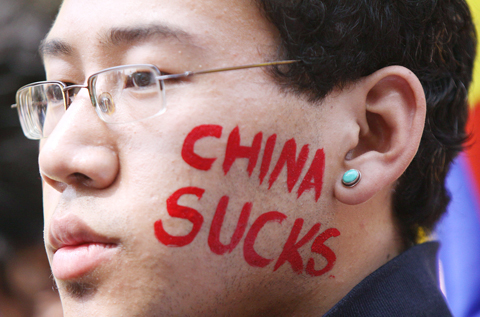Chinese security forces have stepped up a crackdown in Tibet’s capital, Lhasa, two years after protests marking a failed 1959 uprising erupted in deadly violence, the police and reports said yesterday.
The “strike hard storm” began earlier this month and is aimed at cracking down on Tibetan independence activities and ordinary crime, a policeman at the city’s Niangre precinct said by phone.
“I don’t know when we will end this campaign, but it could be at the end of March when this matter is over,” said the policeman, who refused to identify himself, referring to the sensitive anniversaries.

PHOTO: EPA
As of March 3, more than 1,500 extra police and security personnel had been deployed, with more than 4,100 rented apartments or homes inspected, the Lhasa Evening News reported. More than 400 people have been rounded up, but only 14 of them have been formally arrested on unspecified charges, the report said.
“We must clear our eyes, clench our fists, grip our weapons and firmly prevent and severely strike at every separatist or destructive activity that harms national security and social stability,” the Tibet Daily quoted Zhang Yixiong, the region’s deputy Communist Party secretary, as saying this week. “Officers and soldiers are working hard to uphold social stability, safeguard socialist law, the basic interests of the people and the unity of the motherland.”
Police are carrying out identification checks of the city’s migrant population, as well as increasing routine traffic stops, it said.
Residents said on Wednesday that the number of police patrols had been increased in recent days.
An uprising against Chinese rule of the Buddhist Himalayan region erupted on March 10, 1959, but was crushed by China within weeks, forcing the Dalai Lama, Tibet’s spiritual leader, to flee into exile.
Protests took place on the anniversary of the uprising in 2008, escalating in subsequent days into violent riots across Tibet and neighboring regions with significant populations of ethnic Tibetans.
China has said 21 people were killed by “rioters,” while security forces killed only one “insurgent,” but the Tibetan government-in-exile says more than 200 people were killed and 1,000 hurt in the unrest and subsequent crackdown in the remote region.
Residents said yesterday that Lhasa remained tense because of the heavy police and military presence.
“There are armored vehicles patrolling the streets ... the television is always talking about the need to ‘maintain stability,’” said a retired woman in downtown Lhasa who identified herself as Ceyang.
“We don’t dare go out at night,” she said.

In the sweltering streets of Jakarta, buskers carry towering, hollow puppets and pass around a bucket for donations. Now, they fear becoming outlaws. City authorities said they would crack down on use of the sacred ondel-ondel puppets, which can stand as tall as a truck, and they are drafting legislation to remove what they view as a street nuisance. Performances featuring the puppets — originally used by Jakarta’s Betawi people to ward off evil spirits — would be allowed only at set events. The ban could leave many ondel-ondel buskers in Jakarta jobless. “I am confused and anxious. I fear getting raided or even

Kemal Ozdemir looked up at the bare peaks of Mount Cilo in Turkey’s Kurdish majority southeast. “There were glaciers 10 years ago,” he recalled under a cloudless sky. A mountain guide for 15 years, Ozdemir then turned toward the torrent carrying dozens of blocks of ice below a slope covered with grass and rocks — a sign of glacier loss being exacerbated by global warming. “You can see that there are quite a few pieces of glacier in the water right now ... the reason why the waterfalls flow lushly actually shows us how fast the ice is melting,” he said.

RISING RACISM: A Japanese group called on China to assure safety in the country, while the Chinese embassy in Tokyo urged action against a ‘surge in xenophobia’ A Japanese woman living in China was attacked and injured by a man in a subway station in Suzhou, China, Japanese media said, hours after two Chinese men were seriously injured in violence in Tokyo. The attacks on Thursday raised concern about xenophobic sentiment in China and Japan that have been blamed for assaults in both countries. It was the third attack involving Japanese living in China since last year. In the two previous cases in China, Chinese authorities have insisted they were isolated incidents. Japanese broadcaster NHK did not identify the woman injured in Suzhou by name, but, citing the Japanese

RESTRUCTURE: Myanmar’s military has ended emergency rule and announced plans for elections in December, but critics said the move aims to entrench junta control Myanmar’s military government announced on Thursday that it was ending the state of emergency declared after it seized power in 2021 and would restructure administrative bodies to prepare for the new election at the end of the year. However, the polls planned for an unspecified date in December face serious obstacles, including a civil war raging over most of the country and pledges by opponents of the military rule to derail the election because they believe it can be neither free nor fair. Under the restructuring, Myanmar’s junta chief Min Aung Hlaing is giving up two posts, but would stay at the